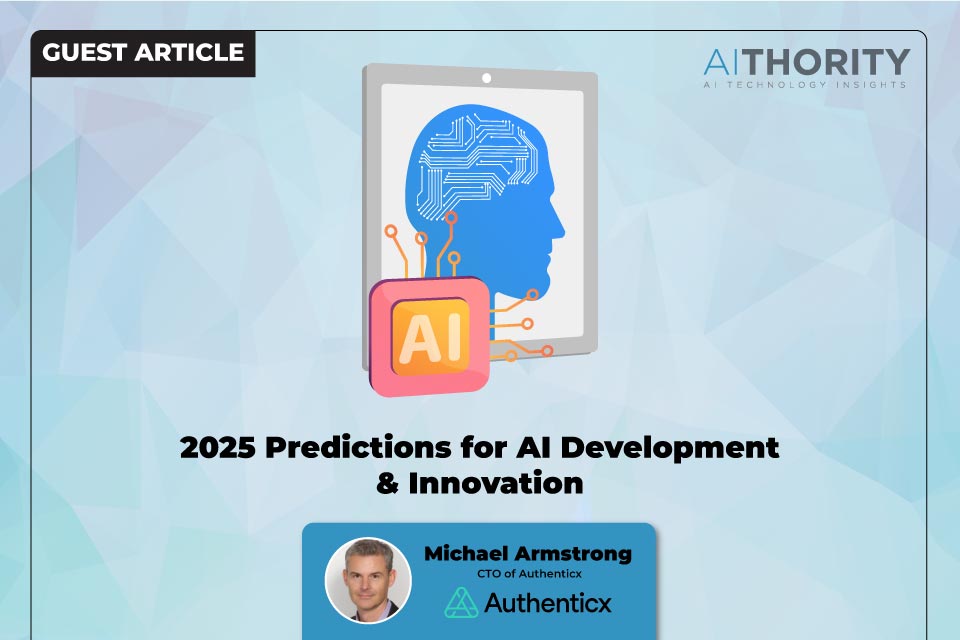As we transfer into 2025, the sphere of synthetic intelligence (AI) continues to evolve at an unprecedented tempo. Nevertheless, this speedy development additionally introduces challenges—particularly in the case of regulation, adoption, and implementation in specialised sectors like healthcare. Whereas AI hype was assuredly felt all through 2024, we additionally noticed leaders scrutinize how and the place AI can positively affect their enterprise extra deliberately. This was mirrored globally with extra inner AI governance boards and rising regulatory steering.
Organizations will have to be intentional and strategic in how they’ll combine AI rapidly into processes in a way that helps personnel and expands how knowledge is leveraged. As we sit up for the 12 months forward, think about these key tendencies and predictions for a way modern AI improvement will intersect with steering and guardrails over the subsequent few years.
Additionally Learn: Wanted Now: AI and Automation Superstars
AI Laws Will Develop
One of the vital important tendencies shaping the way forward for AI is an intensifying regulatory setting. As AI applied sciences proceed to evolve, governments and regulators worldwide are maneuvering to place frameworks in place that shield shoppers, guarantee moral use, and handle dangers related to automation and data-driven decision-making. Subsequent 12 months, we will anticipate this pattern to proceed as regulatory steering turns into extra complicated and complete.
Within the early levels of AI adoption, many laws had been both non-existent or obscure. Nevertheless, as AI-powered techniques turn into extra built-in into day-to-day enterprise operations, there’s a rising name for extra exact and sturdy regulatory frameworks. It’s anticipated that we are going to see extra detailed directives, notably concerning transparency, knowledge utilization, equity, and accountability, within the coming 12 months.
AI suppliers (builders) and organizations integrating AI into their operations (customers) might want to navigate this shifting regulatory panorama rigorously. Because the regulatory setting catches up with technological advances, corporations will have to be proactive and clear of their AI methods. Creating robust inner insurance policies round AI ethics, danger administration, and transparency might be useful, strategic steps as we glance ahead.
Enterprise Healthcare Will Have to Make Speedy Pivots
Within the healthcare sector, AI is already having a profound affect, from enhancing diagnostic accuracy to streamlining administrative duties. Nevertheless, massive enterprise healthcare organizations usually are usually extra bureaucratic and fewer agile than smaller, extra nimble corporations. This makes it more durable for them to quickly implement new applied sciences and maintain tempo with the velocity of AI improvement and adoption.
Smaller healthcare corporations sometimes have organizational flexibility and a much less complicated infrastructure to rapidly pivot and innovate. These corporations can take dangers, experiment with new AI fashions, and push the boundaries of what’s potential in ways in which massive establishments can not. By 2025, we anticipate that bigger enterprise healthcare organizations will start to be taught from these smaller, extra agile gamers. We see these fast pivots rising with extra versatile staff buildings that encourage innovation. Inside incentives—reminiscent of efficiency bonuses for groups that efficiently implement AI-powered options or reward techniques for artistic considering—will turn into extra frequent. Moreover, enterprise organizations will more and more look to accomplice strategically with know-how suppliers to combine options, slightly than attempting to construct internally.
Profitable AI Scaling Calls for Specificity
As AI continues to advance within the healthcare area, one of the vital tendencies is the shift in direction of off-the-shelf AI fashions that may be fine-tuned for particular industries and use instances. Healthcare organizations face a novel set of challenges, from managing huge quantities of affected person knowledge to making sure compliance with laws like HIPAA. Constructing AI techniques from the bottom up that take note of the distinctions from one case to a different is time-consuming and costly. For AI to be actually efficient, it must be tailor-made to grasp complicated phrases, meet compliance requirements, and perceive healthcare’s nuances.
Additionally Learn: The Important Automation Toolkit – Tips about Find out how to Succeed
As we sit up for 2025, slightly than creating new AI fashions from scratch for each distinctive healthcare utility, organizations will more and more depend on pre-trained AI fashions that may be personalized, or “formed”, to satisfy their particular wants. These industry-specific fashions will already be educated on massive datasets, which suggests they’ll have the ability to acknowledge patterns, make predictions, and remedy issues related to the healthcare sector. This strategy permits healthcare organizations to leverage superior AI capabilities with out the burden of creating know-how from scratch, thus accelerating the adoption of AI options throughout the {industry}.
The panorama of AI improvement will proceed to shift quickly with vital implications for each companies and industries. On this dynamic and quickly evolving setting, the important thing to success might be adaptability. This adaptability comes from proactively wanting ahead and anticipating technological wants and being strategic in defining what drawback your groups are aiming to resolve. AI innovation will proceed to be an vital consideration and answer for organizational challenges. Groups that may navigate the complexities of regulation, foster a tradition of innovation, and implement the best AI options might be well-positioned to guide within the years to return.
[To share your insights with us as part of editorial or sponsored content, please write to psen@itechseries.com]

